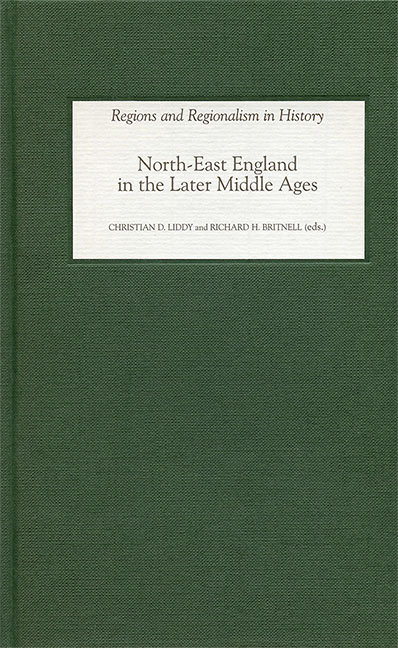Book contents
- Frontmatter
- Contents
- List of Illustrations
- Contributors
- Preface
- Abbreviations
- Introduction
- 1 St Cuthbert and the Border, c.1080–c.1300
- 2 John Hardyng, Northumbrian Identity and the Scots
- 3 Remembering the Legal Past: Anglo-Scottish Border Law and Practice in the Later Middle Ages
- 4 Scaling the Ladder: The Rise and Rise of the Grays of Heaton, c.1296–c.1415
- 5 Land, Legend and Gentility in the Palatinate of Durham: The Pollards of Pollard Hall
- 6 Local Law Courts in Late Medieval Durham
- 7 The Free Court of the Priors of Durham
- 8 Church Discipline in Late Medieval Durham City: The Prior as Archdeacon
- 9 Economy and Society in North-Eastern Market Towns: Darlington and Northallerton in the Later Middle Ages
- 10 Newcastle Trade and Durham Priory, 1460–1520
- 11 The Size and Shape of Durham’s Monastic Community, 1274–1539
- 12 Peasants, Landlords and Production between the Tyne and the Tees, 1349–1450
- 13 Wastes, the Margins and the Abandonment of Land: The Bishop of Durham’s Estate, 1350–1480
- 14 Framing Medieval Landscapes: Region and Place in County Durham
- Index
6 - Local Law Courts in Late Medieval Durham
Published online by Cambridge University Press: 23 March 2023
- Frontmatter
- Contents
- List of Illustrations
- Contributors
- Preface
- Abbreviations
- Introduction
- 1 St Cuthbert and the Border, c.1080–c.1300
- 2 John Hardyng, Northumbrian Identity and the Scots
- 3 Remembering the Legal Past: Anglo-Scottish Border Law and Practice in the Later Middle Ages
- 4 Scaling the Ladder: The Rise and Rise of the Grays of Heaton, c.1296–c.1415
- 5 Land, Legend and Gentility in the Palatinate of Durham: The Pollards of Pollard Hall
- 6 Local Law Courts in Late Medieval Durham
- 7 The Free Court of the Priors of Durham
- 8 Church Discipline in Late Medieval Durham City: The Prior as Archdeacon
- 9 Economy and Society in North-Eastern Market Towns: Darlington and Northallerton in the Later Middle Ages
- 10 Newcastle Trade and Durham Priory, 1460–1520
- 11 The Size and Shape of Durham’s Monastic Community, 1274–1539
- 12 Peasants, Landlords and Production between the Tyne and the Tees, 1349–1450
- 13 Wastes, the Margins and the Abandonment of Land: The Bishop of Durham’s Estate, 1350–1480
- 14 Framing Medieval Landscapes: Region and Place in County Durham
- Index
Summary
By the thirteenth century local justice in rural England was embodied primarily in two courts: those of the manor and hundred (or wapentake). The manor court was a seigniorial instrument, regulating the lord's estate but also providing to the villein tenants a basic forum for civil litigation that otherwise they would be denied. The hundred and wapentake courts were royal or public courts, and the jurisdiction often was described as leet jurisdiction, or the view of frankpledge. Historians have assumed that these same courts functioned across England, with minor variations (and then more in name or shape than actual competence). However, like the manor, which historians once assumed to have a common, standard form, the rural local courts were quite diverse, perhaps more so than has been thought. In Durham, at least, local justice differed greatly from what would be found in Suffolk or Cambridgeshire. This cannot be questioned. The larger implications are far less clear. Has the uniformity of the local courts been exaggerated like the manor? Or, if Durham is an aberration, to what is this due?
A satisfactorily comprehensive answer to this question may be completely elusive, since many records do not survive. Still, there are at least three avenues of approach to this question, three starting points for fresh investigations. First, it is clear that, as a result of landlords exercising public functions on their estates, the divisions between manorial and hundredal jurisdiction were not always original but were imposed later, at times artificially. Separate hundred and manorial courts from the time of the Norman Conquest and before were not uncommon, but frequently a single court exercised a more plenary competence. Parallel to developments in the common law, the quo warranto inquests of the late thirteenth century firmly established the separation of these two courts in theory: a lord required a specific royal grant to claim hundred jurisdiction. The ‘public’ and ‘private’ spheres now were separate, even if only according to the jurists. To what extent was this separation true throughout all of England, or was there a gap between theory and practice? The jurists of Edward I often effected the division of local judicial competence in contravention of existing practices. Had Edward I had his way, local justice would have been regularised, most of it in the king's hand; but he was forced to back down on his claims.
- Type
- Chapter
- Information
- North-East England in the Later Middle Ages , pp. 97 - 110Publisher: Boydell & BrewerPrint publication year: 2005
- 1
- Cited by



